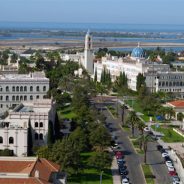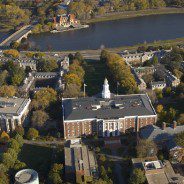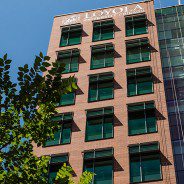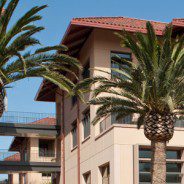Search results for :
Full-Time MBA
University of San Diego Full-Time MBA Program Structure
Both tracks (General Management and International Business) of the University of San Diego full-time MBA program offer courses on campus daily and students can complete the program in 22 months (or 17 months at an accelerated rate) beginning in August. In-person classes may be currently impacted by COVID-19. The program utilizes learning teams and group work/projects; full-time students are expected to be available during daytime hours to conduct this group work. As full-time MBA students move into the second year of the program and enroll in electives, primarily offered in the evenings, they have the opportunity to pursue daytime internships or part-time employment off-campus.
Curriculum at the San Diego Full-Time MBA
The University of San Diego’s full-time MBA consists of 53 units. Of these, 31 are derived from core courses, and 22 from electives
The programs cover courses in responsible leadership development; core business functions; corporate social responsibility, sustainability, and ethics; and integrative problem-solving. In addition, the international focus MBAs will take specialized coursework on international business core functions.
In addition, students have many opportunities to supplement their class studies with global opportunities. They may opt to take part in international consulting practicums to work on an intensive consulting project in places such as Buenos Aires, Brazil, or China. Study abroad opportunities, semester exchange programs, international internships, and even international dual degree programs are also available. Students have a choice of 8 concentrations should they choose to pursue one: Business Analytics, Corporate Social Responsibility and Sustainable Enterprise, Entrepreneurship, Finance, International Business, Managerial Leadership, Marketing, and Supply Chain Management.
San Diego Full-Time MBA Rankings
- #1 Ranked Global MBA Program in San Diego, 2018 Financial Times
- #1 Ranked Full-Time MBA in San Diego, Bloomberg Businessweek
Class Profile
The University of San Diego full-time MBA program Fall 2020 Full-Time MBA cohort consisted of 30 students. The average age of students was 29 years of age, while the average G.P.A was 3.3. 33 percent of the student body was female, while 30% was international students. In addition, the middle GMAT range was 510-690.
Tuition, Scholarships, and Financial Aid
The University of San Diego full-time MBA tuition is charged on a per-unit fee of $1,565 in 2020-2021. The total tuition cost is $82,945.
The School of Business Administration does offer merit scholarships for applicants with exceptional GMAT scores, work experience, or other accomplishments. At a $5,000 minimum, these scholarships are announced at the time of a student’s admission to the school.
In addition, students may apply for graduate assistantships to balance the tuition costs. By assisting a faculty member’s research for 40 hours over the course of a semester, students may receive $1,200 tuition assistance.
Furthermore, students may receive loans and grants based on financial need. In order to qualify for this assistance, students should fill out a FAFSA form by April 1.
Scholarships are also available for students who take classes that require international travel. Students who meet the criteria for academic achievement, career goals, and financial need are eligible for these Ahlers Center for International Business scholarships.
Students may also seek on-campus employment. This is often a good option for international students with a student visa status.
Lastly, military students may qualify for the GI Bill benefits and the Yellow Ribbon Program.
Admissions
University of San Diego full-time MBA applicants must submit an online application with three essays (and an additional optional essay), official transcripts from all previous schools, a résumé, a GMAT or GRE score, two recommendations, an $80 application fee, and (if applicable) an official TOEFL score. The program may waive the GMAT or GRE requirement for applicants with an MD or PhD in the fields of science or technology.
International applicants must also submit a Certification of Finances Form. If needed, applicants may submit a degree evaluation via the World Education Services to prove their degree is equivalent to a U.S. bachelor’s degree.
2021-2022 San Diego Full-Time MBA Deadlines
- November 1
- January 15
- March 1
- May 1
Professional MBA
University of San Diego Professional MBA Program Structure
The University of San Diego Professional MBA offers two tracks: the onsite format, which begins in the fall and the hybrid format which begins in the spring. Students in the onsite format meet on campus around two nights per week (on weekdays) from 5:30 to 7 p.m. After the first semester, students can alter their study structures.
Students in the hybrid format will mix and match online and onsite classes. The latter of which meet up on weekends once per month.
Curriculum
The University of San Diego Professional MBA requires 31 credits of core curriculum and 22 credits of elective coursework, which totals 53 credits. The program includes courses in responsible leadership development; core business functions; corporate social responsibility, sustainability, and ethics; and integrative problem solving.
In addition, students have an opportunity to supplement their class studies with a global opportunity. They may opt to take part in international consulting practicums to work on an intensive consulting project in places such as Buenos Aires, Brazil, or China.
Part-Time MBA Rankings
• U.S. News & World Report: 140 (tie)
Class Profile
Students in the University of San Diego Professional MBA program are on average 29-years old, have 6.5 average years’ worth of experience, and a median GMAT of 578. About 42 percent of students are women, and the average GPA is 3.3.
Tuition, Scholarships, and Financial Aid
The University of San Diego Professional MBA tuition is charged on a per unit fee. The Professional MBA takes an estimated two-and-a-half years to finish. Recently reported tuition is $1,520 per unit, for a total of $80,560. A $1,500 deposit is required.
The School of Business Administration does offer merit scholarships for applicants with exceptional GMAT scores, work experience, or other accomplishments. At a $5,000 minimum, these scholarships are announced at the time of a student’s admission to the school.
In addition, students may apply for graduate assistantships to balance the tuition costs. By assisting a faculty member’s research for 40 hours over the course of a semester, students may receive $1,200 tuition assistance.
Furthermore, students may receive loans and grants based on financial need. In order to qualify for this assistance, students should fill out a FAFSA form by April 1.
Scholarships are also available for students who take classes that require international travel. These Ahlers Center for International Business scholarships are awarded to students who meet the criteria for academic achievement, career goals, and financial need.
Lastly, military students may qualify for the GI Bill benefits and the Yellow Ribbon Program.
Admissions
University of San Diego Professional MBA applicants must submit an online application with three essays (and an additional optional essay), official transcripts from all previous schools, a résumé, a GMAT or GRE score, two recommendations, an $80 application fee, and (if applicable) an official TOEFL score. The GMAT or GRE requirement may be waived for applicants holding an MD or Ph.D. in the fields of science or technology. Additionally, five or more years of work experience in these fields or business could also support a GMAT waiver; the University of San Diego also requires a minimum undergraduate GPA of 3.0 and proof of academic success in at least one calculus course at the undergraduate level.
Applicants are expected to have at least two years of professional work experience prior to applying.
International applicants must also submit a Certification of Finances Form. If needed, applicants may submit a degree evaluation via the World Education Services to prove their degree is equivalent to a U.S. bachelor’s degree.
Fall: Full-time MBA and Evening Part-Time MBA
- November 1
- January 15
- March 1
- May 1
Spring: Hybrid MBA only
- October 1
- December 1
FlexEvening and FlexWeekend
UC San Diego FlexEvening and FlexWeekend MBA Program Structure
Both the UC San Diego FlexEvening MBA and FlexWeekend MBA at Rady School of Management are designed to allow working professionals to fully focus on their education without disrupting their careers.
The UC San Diego FlexEvening MBA’s core courses are offered on Tuesday and Thursday evenings from 6:30 to 9:30 p.m. Most students take two classes each quarter. The program meets two evenings weekly and is completed in 30 months.
The UC San Diego FlexWeekend MBA offers classes on alternating weekends, and students will attend Friday courses from 8:00 am to 5:30 pm, as well as Saturday courses from 8 a.m. to 5 p.m. Students typically take three courses per quarter. The program duration is 24 months, on alternating Friday and Saturdays. Students are provided with meals and lodging during class weekends.
Due to applicants’ reduced ability to access and prepare for the GMAT or GRE as a result of the COVID-19 pandemic, we will waive the GRE/GMAT requirement for all FlexEvening and FlexWeekend MBA applicants for Fall 2020. All applications must be submitted before the final deadline of July 15 for the Fall 2020 enrollment.
Curriculum
UC San Diego FlexEvening MBA students generally takes 2.5 years to complete their degree with two classes each quarter. The first three quarters are filled with core courses such as managerial economics, operations management, and marketing. The last two years include more electives, professional seminars, and Lab to Market courses. The Lab to Market courses are unique to the Rady School, and they provide instruction on the ways to turn ideas into real-life marketing opportunities.
Similarly, the FlexWeekend MBA requires two years to complete, and students generally take three classes each quarter. These students also focus on core courses in the first year, with more electives and seminars in the second year.
In addition, FlexMBA students have access to support services including lodging, dinner, class videotaping, and teaching assistants who keep hours for working students.
Part-Time MBA Rankings
• U.S. News & World Report: 35 (tie)
Class Profile
Twenty-five students are enrolled in the most recent UC San Diego FlexWeekend MBA class, with 64 percent are male and 36 percent are female. The average student age is 40 with 15 years of experience. About 40 percent of the class holds advanced degrees. The student GMAT score median is 598.
Forty-four students are enrolled in the most recent UC San Diego FlexEvening MBA class, with 64 percent are male and 36 percent identifying are female. The average student age is 32 with 8.3 years of work experience, and 30 percent of the class holds advanced degrees. The student GMAT score median is 599.
Careers
Rady Graduate Career Connections actively works with Rady students to provide assistance during the application process for internships or full-time employment, and prepare them for career success through guidance and mentoring. Students may partake in personalized coaching, which includes advice on interviewing, choosing a career path, and more. Students also have the opportunity to participate in programs to jumpstart their professional development, including two student and alumni startup accelerators, the Executive Mentor program and Rady Venture Fund. Career Connections also offers workshops on cover letter writing, résumé development, networking skills, as well as other topics.
Tuition, Scholarships, and Financial Aid
The most recent published tuition figures show that UC San Diego FlexMBA students pay $1,220 per credit unit, and the full program requires 92 credit units. The fees are billed quarterly.
Financial aid may be available for MBA students who submit a FAFSA form. Fellowships and loans – such as the Federal Stafford Loan – may also provide financial aid. Furthermore, students may apply for grants to finance their MBA, and these do not need to be repaid.
Individuals who have a military service background are encouraged to pursue the Rady School MBA. The MBA application fee is waived for current and former members of the military. Active duty military may use the UC San Diego Financial Aid Office to learn how to use their military education benefits. Meanwhile, veterans are encouraged to review the GI Bill website to use their benefits for education. Lastly, military scholarships are also available for MBA students who meet the Council of College and Military Educators’ (CCME) requirements. Post 9/11 GI Bill and CMME scholarships are also available for active military and veterans.
For the FlexWeekend program, lodging is included during Friday evenings for scheduled classes.
Fellowships will be awarded to individuals entering the FlexWeekend MBA program. These fellowships are open to professionals currently working in the life sciences, technology or clean technology sectors in San Diego. Individuals selected will demonstrate a commitment to the region and to their industry, significant contributions to their organizations and the potential to make a significant impact in sustaining and enhancing San Diego’s innovation-focused business community. In order to be considered for a fellowship, individuals must formally apply and be admitted to the UC San Diego FlexWeekend MBA program.
Admissions Procedures
Due to applicants’ reduced ability to access and prepare for the GMAT or GRE as a result of the COVID-19 pandemic, we will waive the GRE/GMAT requirement for all FlexEvening and FlexWeekend MBA applicants for Fall 2020. All applications must be submitted before the final deadline of July 15 for the Fall 2020 enrollment.
To apply to the UC San Diego Rady School MBA, prospective students should fill out an online application and submit the application fee. Additional required materials include:
-
- Online application form
- Transcripts
- Resume or CV
- Recommendations
- Three Essays
- GMAT or GRE Scores
- TOEFL, IELTS or PTE Score (for international applicants only)
- $200 Application Fee
Application deadlines are as follows:
► Round 1: December 1, 2021
► Round 2: February 1, 2022
► Round 3: April 1, 2022 (Final International Deadline)
► Round 4: May 15, 2022
► Final Deadline: July 1, 2022
Full-Time MBA
UC San Diego Full-Time MBA Program Structure
The UC San Diego full-time MBA courses at Rady School of Management are held between 8 am and 4:30 p.m. The core classes take place on weekdays, and most students take four classes each quarter. The program lasts six quarters, or 21 months, with an internship after the first year.
Curriculum
The first year of the UC San Diego full-time MBA requires 13 core courses, one elective, and a capstone Lab-to-Market class. The core courses cover topics such as accounting, finance, and quantitative analysis, whereas the elective courses include studies in negotiation, project management, and strategic cost management. Students also take one course called Lab-to-Market, which provides instruction on ways to take ideas and turn them into real-life market opportunities.
Meanwhile, the second year full-time MBA students take nine electives, three professional seminars, and two Lab-to-Market workshops.
Full-Time MBA Rankings
• U.S. News & World Report: 69 (tie)
• Bloomberg: 60
Class Profile
The most recent UC San Diego full-time MBA class had 46 enrolled students representing 12 different countries. The average GPA was 3.5 and the median GMAT was 656. Work experience of matriculating students averaged 5.5 years and the average student age is 29. Around 28 percent of the entering class are female, while 72 percent are male.
Careers
The Rady Graduate Career Connections offers several programs and resources. Students may partake in personalized coaching, which includes advice on interviewing, choosing a career path, and more.
Rady Graduate Career Connections actively works with Rady students to provide assistance during the application process for internships or full-time employment, and prepare them for career success through guidance and mentoring. Students also have the opportunity to participate in programs to jumpstart their professional development, including two student and alumni startup accelerators, the Executive Mentor program and Rady Venture Fund.
Tuition, Scholarships, and Financial Aid
According to recent published figures, the UC San Diego full-time MBA’s academic fees are approximately $51,453 for CA residents and $54,968 for out-of-state students. Additional fees for student services and the recreation facility are also included in the total amount.
Financial aid may be available for full-time MBA students who submit a FAFSA form.
Fellowships are available for students who have backgrounds in the life sciences, as well as deserving individuals who have overcome significant barriers to higher education. Furthermore, students may apply for grants to finance their education, and these do not need to be repaid.
Rady provides merit-based fellowship support to exceptional individuals. All domestic and international admitted students are invited to apply for a Rady fellowship, by downloading the fellowship application from the MBA application system.
Individuals who have a military service background are encouraged to pursue the Rady School MBA. The MBA application fee is waived for current and former members of the military. Active duty military may use the UC San Diego Financial Aid Office to learn how to use their education benefits. Meanwhile, veterans are encouraged to review the GI Bill website to use their benefits for education. Lastly, military scholarships are also available for MBA students who meet the Council of College and Military Educators’ (CCME) requirements.
Admissions
To apply to the UC San Diego Full-Time MBA, prospective students should fill out an online application and submit the application fee. Additional required materials include: transcripts from all other academic institutions, a current résumé, two recommendations, three essays, GMAT or GRE scores, and TOEFL or IELTS scores (if needed).
The GMAT/GRE score may be waived for applicants who have a master’s/Ph.D. in a quantitative subject (such as engineering or science), as well as those who hold an M.D. from a U.S. medical school.
Applications are processed on a rolling admissions basis, meaning they are evaluated as they are received. Admissions decisions are usually made within four to six weeks after receiving a complete application.
MBA application requirements:
-
- Online application form
- Transcripts
- Resume or CV
- Recommendations
- Essays
- GMAT or GRE Scores
- TOEFL, IELTS or PTE Score (for international applicants only)
- $200 Application Fee
Application deadlines are as follows:
Fall 2022 Deadlines
Full-Time MBA
► Round 1: October 15, 2021
► Round 2: November 15, 2021
► Round 3: January 15, 2022
► Round 4: March 1, 2022
► Final Deadline: June 1, 2022
MBA
Alliant’s California School of Management & Leadership MBA Program Structure
The Alliant International University MBA is designed for working professionals. Classes are offered in the evening at the San Diego campus. Students can also complete their MBA studies entirely online.
The MBA program now offers two tracks:
- The Professional MBA track is designed for students without business leadership experience. Courses are offered on-campus in the evenings and will include three professional practicum courses.
- The Practical Training MBA track is ideal for working professionals and international students focused on career advancement. Courses include practical training and are taught in an online and on-campus hybrid format.
Curriculum
Alliant’s California School of Management & Leadership MBA students who majored in business as an undergraduate take 12 courses. Non-business majors take two additional courses, Financial and Managerial Accounting, and International Economics and Trade. Business undergraduates at Alliant can take advantage of the Direct Pathway program to accelerate their path toward an MBA.
All MBA students take the same eight core classes as a cohort: International Marketing Management, Organizational Behavior and Global Leadership, Strategic Management, Statistical Analysis and Modeling for Business, Financial Management, Technology for Managerial Decision Making, Operations Management and Logistics, and Management In the New Age (Capstone).
Students can also choose several specializations in the program, such as: Marketing and Digital Trends, Corporate Finance, Information Systems and Technology, Hospitality Management, and more.
CSML also offers MBA students the option to build their own concentration so that they can get the exact education they want for the exact career they want.
The concentration offerings for the MBA in Business Administration are designed to give students a higher level of mastery in a specific area of their choosing. This focus provides students with a deeper knowledge in their chosen concentration and allows for greater career advancement opportunities in their field of study. Concentrations include Corporate Finance, Hospitality Management, Information and Technology Management, Marketing and Digital Trends, and Management & Leadership.
Tuition, Scholarships, and Financial Aid
For the 2022-23 academic year, tuition is $541 per unit for the Alliant California School of Management & Leadership’s MBA, totaling $19,484 plus any additional fees. Students can apply for a range of grants and scholarships, including the Alliant’s California School of Management & Leadership’s MBA Scholarship, which covers 33 percent of tuition for each semester, and the MBA Direct Path Scholarship, for undergraduate alumni of Alliant International University.
Admissions
In order to apply to the Alliant’s California School of Management & Leadership MBA program, applicants must provide:
- Official transcripts
- A completed online application
- A current resume
- 1-2 page personal essay
- Proof of English proficiency (if necessary)
- Two letters of recommendation – Recommendations should be from references familiar with your work, your academic abilities, or your potential for scholarship and professional accomplishment.
- Faculty interview
All applicants must also meet one of the following requirements:
GPA Minimum of 2.75 or GPA Exemption Petition. Interview may be required.
The following two (2) prerequisite courses are required for students without a business major:
-
- ACT5000 – Financial and Managerial Accounting (3 units)
- ECO5000 – International Economics and Trade (3 units)
The Alliant’s California School of Management & Leadership MBA uses rolling admissions deadlines, but recommends applying early.
Suffolk Celebrates EMBA 40th Anniversary
Suffolk University will be celebrating the 40th anniversary of the Executive MBA program at the Sawyer School of Business. The program, which was founded in 1975, was the first EMBA program in New England. The program has welcomed almost 2,000 alumni through the program. The anniversary celebration will be held Nov. 12 from 6 p.m. to 8 p.m. The event will be held at the Union Club of Boston.
The Suffolk Executive MBA program is a 16 month program with classes held at the Suffolk campus in Boston on Saturdays. The Suffolk EMBA was designed for mid-career and senior-level executives. Suffolk’s program is taught in a cohort structure and includes four residential seminars. The Sawyer EMBA also features a Global Travel Seminar. The Global Travel Seminar features realize case studies at major global businesses.
Tips for Tackling the “Why Do You Want an MBA?” Application Essay Question
You’ve put the time in studying for the GMAT, you’ve narrowed your list of schools, you’ve identified your recommenders and asked them to write letters on your behalf. There’s no more putting it off. It’s time to tackle those essays. Second round deadlines are coming up for a lot of schools, including the Anderson School of Management at UCLA, which has a January 5, 2016 second deadline. That may seem like plenty of time, but when it comes to your essay, skimping on your work is not a good idea. Continue reading…
Big Shoes to Fill at HBS as Dee Leopold Announces Plans to Step Down
This post has been republished in its entirety from original source clearadmit.com.
Dee Leopold, who has helmed admissions at Harvard Business School (HBS) for the past decade, will handpick her last class at the school as part of this admissions season. Confirming reports that began circulating after an email yesterday to the HBS community from Jana Kierstead, executive director of Harvard’s MBA program, Leopold herself took to her “Direct from the Director” blog today to share the news with prospective applicants.
“It’s been a fabulous ten years,” she wrote. “This is a great job and HBS is an amazing place to build a career. I’m ready for something new and it’s a privilege to have senior leadership that helps navigate change.”
Her departure will not impact this year’s admissions cycle, she stressed. “I am here on-the-job until the Class of 2018 (that’s you!) is all set and ready to go,” she wrote. Continue reading…
Collegiate Entrepreneurs’ Organization at Robinson College Encourages Student Leadership and Innovation
In four years since its inception, the Collegiate Entrepreneurs’ Organization (CEO) at Georgia State’s J. Mack Robinson College of Business has become an indelible fixture for encouraging student entrepreneurship at the college.
Direct from the Dean: Quinlan’s Kevin Stevens
We spoke with Dean Kevin T. Stevens at Loyola University Chicago’s Quinlan School of Business. He is the first in our Direct from the Dean interview series, which will feature deans from top MetroMBA schools.
Kevin Stevens became dean on July 1, 2015. He holds a Doctorate of Business Administration (Accountancy) from the University of Kentucky, a Master of Accounting Science from the University of Illinois at Urbana-Champaign, and a Master of Science in Taxation from DePaul University. Before becoming the dean of Quinlan, Kevin Stevens served DePaul University for 25 years. He grew the School of Accountancy and Management Information Systems to more than 1,200 undergraduates, and also secured more than $12 million in funding over five years. Continue reading…
Oxford Saïd Hosts Lively Debate On Corporate Responsibility
As part of its annual MBA Launch program, Oxford University’s Saïd Business School recently hosted a debate between faculty members that addressed whether corporations are responsible for practicing social responsibility as part of their business models.
Oxford alumni accompanied debaters Oren Sussman, Reader in Finance, and Richard Barker, Professor of Accounting in the discussion. Sussman’s assertion was that corporations should use their resources to focus on making money rather than filter them into working toward change in areas such as the climate crisis and social inequality. Barker’s team held the opposing opinion that while corporations should obviously function for profit, responsibility toward such societal issues can and should be integrated into their practices to achieve a greater goal.
Advice from Clear Admit: Understanding the MBA Admissions Interview, Part II
This post has been republished in its entirety from its original source clearadmit.com. This is the second in Clear Admit’s three-part series on the MBA admissions interview. In case you missed it, view Part I here.
Okay—now that you’re clear on open interviews and interviews by invitation, let’s get into some of the finer points. What’s this about blind versus non-blind interviews, you ask? Some schools believe strongly in the notion of blind interviews, which means that your interviewer will know nothing about you in advance of the interview other than what appears on the resume you give them. Continue reading…
Preparing for MBA Recruitment Before You Apply
As the MBA interview season kicks off, so does the MBA recruitment season for full-time MBA students entering their second year. While you may only be in the MBA application stage, it’s important to prepare yourself for the future before you ever enter a program. Heading into your MBA program with the right expectations about recruitment and how it will work for you is the best preparation you can make for your future. Recruitment will be a large part of the second half of your full-time MBA program and by preparing for it from the start, you’ll have a better chance of successfully gaining employment at the firm and in the industry you want. Continue reading…
Which MBA Program Is Right for You: Full-time, Part-time, or Executive?
When it comes to your MBA program, there are a variety of options available to you. Not only do you need to choose the correct school, but also selecting the right program within the school is just as important. There are a few standard MBA program formats: full-time, part-time, and executive. Each program type offers unique opportunities, requirements, and class profiles. At the end of the day, it’s a matter of which MBA program is right for me. Continue reading…
Anisfield Holds Sebastian J. Raciti Memorial Lecture
The Anisfield School of Business will be holding the Sebastian J. Raciti Memorial Lecture on Oct. 21, 2015. The event will be held at the Trustees Pavilion at the School of Business campus. During the event the Raciti Memorial Scholarship will be awarded. Sebastian Raciti was one of the founding facility of the Anisfiled School of Business. During his 31-years at ASB, he served as the Dean of the School, academic vice president, and was also a professor of economics.
The event’s guest speaker will be Peter G. Klein, a professor from the Hankamer School of Business at Baylor University. He is also a Senior Research Fellow with Baylor’s Baugh Center for Entrepreneurship and Free Enterprise. His talk for the event is titled, “Entrepreneurship in a Market Economy: What Business Students Need to Know.”
Average GMAT Up, Percentage of Women, Minorities, International Students Down at Stanford GSB
This post has been republished in its entirety from original source clearadmit.com.
Stanford Graduate School of Business (GSB) this week released its Class of 2017 profile, revealing the highest average GMAT score—733—of all leading business schools. It’s just a one-point gain over last year for the Palo Alto school, but enough nonetheless to stay in front of the University of Pennsylvania’s Wharton School, where the average this year was 732. The average undergraduate GPA for the incoming class at Stanford GSB also was a record setter at 3.75—perhaps part of what led the Admissions Committee to add that component to its publicly shared profile statistics for the first time this year.
As it does each year, the school noted that especially given its smaller class size, “even two students can, and do, create” variations in percentages in the overall profile, This year, those variations included dips in the percentage of women (40 percent this year, down from 42 percent last year), minorities (19 percent, down from 23) and international students (40 percent, down from 44). Continue reading…
Cameron School of Business to Host First-Ever Business Symposium
The Cameron School of Business at the University of St. Thomas will hold its first-ever Business Symposium for the university community and Houston-area entrepreneurs. The goal of the symposium will be to assist professionals across several industries run their businesses with innovation and responsibility to positively impact their community.
Do MBA Program Rankings Matter?
When attending any graduate or undergraduate program, school rankings tend to carry a lot of weight and have a recognizable impact on future opportunities. For example, attending an elite university such as Harvard will typically provide students with far more job opportunities, higher starting salaries, and a greater possibility of future success compared to a less well-known institution. But does the same hold true for MBA programs, particularly when many MBA applicants have very specific goals and needs?















